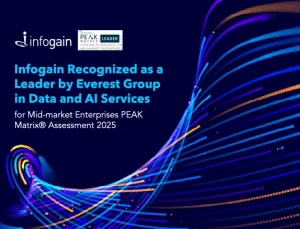Generative AI refers to algorithms that have the capability to create original content, including text, images, videos, or audio
- Posted on : September 4, 2023
-
- Industry : Corporate
- Type: News

The story sheds light on how Generative AI has lately garnered immense interest and sparked extensive discussions, specifically around large language models (LLMs). Anil Kaul, CAIO, Infogain shares his insights in this article on how Gen AI encompasses much more than just ChatGPT.
Read the full story to know how AI can be the game-changer in the way the world works and opens doorways to unprecedented possibilities.
New Delhi: As generative AI (aka chatbots) spark a lot of debate among its stakeholders, industry leaders in India believe that while there are some risks associated primarily related to data, privacy and security, generative AI has more opportunities than risks and we are yet to explore its true potential to improve productivity, ingenuity, creativity, efficiency, and communication.
Generative AI refers to algorithms that have the capability to create original content, including text, images, videos, or audio. “Generative AI (GenAI), specifically around large language models (LLMs) has lately garnered a lot of interest and sparked a lot of discussion in the community. GenAI is an assistive and augmented technology when used by humans, it can add to the creativity and ingenuity of humans,” Vic Gupta, Chief Technology Officer, Coforge, told IANS.
To adapt and empower the workforce with the necessary skills and tools, Coforge has proactively developed internal learning paths and curriculum. “To demonstrate our preparedness and effectiveness in various industries and across different use cases, we have identified over 100 potential scenarios, use cases and solutions that solve one or more client business problems,” Gupta informed.
The company has also partnered with Microsoft as their investments in OpenAI align perfectly with its goals. “We have already integrated the public OpenAI into our Quasar, an Intelligent AI Platform, allowing us to utilise ChatGPT APIs for tasks such as data summarisation, classification, and segmentation,” said Gupta.
While ChatGPT has gained significant attention recently, it’s important to understand that generative AI encompasses much more than just ChatGPT. “For instance, when you pose a question to ChatGPT and receive an answer, the algorithm generates the text of the response based on its learning from a vast amount of training data. Similarly, other generative AI algorithms like DALL-E can generate images based on text prompts given to them,” said Anil Kaul, Chief AI Officer, Infogain. GenAI has many potential applications.
For example, a portfolio manager at a bank could use GenAI to generate investment advice. “In customer relationship management (CRM) systems, GenAI can summarise conversation transcripts and extract pending action items that the customer support team can follow up on. In technical support, GenAI plays an important role in finding resolutions to myriad issues in a quick and effective manner,” Prabhakar Srinivasan, Director of Technology, AI/ML/Data Science at Synechron, told IANS.
In cybersecurity or finance, generative models can learn what normal transactions or network traffic look like and generate alarms when anomalies occur. “GenAI can also generate code which can be a productivity boost for developers. In all these examples of applications, GenAI augments the capabilities of human experts and hence plays the role of co-pilot,” Srinivasan informed.
While generative AI has its perks, one key issue faced by users is Artificial Intelligence hallucinations. When we feed in a question and the systems don’t understand the question or it’s misinterpreted, the system generates a response regardless, with incorrect information. Something that doesn’t actually exist. “Added to this, its data-driven algorithms limit the system’s information pool. The systems struggle with understanding context, especially when presented with new or unfamiliar information or scenarios. It lacks creativity and tends to miss nuances while creating content- which can be fixed with human touch,” informed Jacob Joseph, VP “Data Science, CleverTap.
According to Srinivasan, relying heavily on generative AI without the necessary checks and balances from a human expert to validate the results can lead to potentially unsafe and/or unethical or biased applications. “Guardrails must be put into place due to legal and ethical issues around copyrights and attribution of source. There are also some risks on how people will use them, creating deep-fakes or generating fake news,” he noted.
Even in its most basic form, ChatGPT could be deployed as a more advanced customer support chatbot. “We have already seen glimpses of this with Intercom announcing ‘Fin’, a GPT-4 powered customer service chatbot that requires zero setups and understands complicated support tickets without human intervention. Furthermore, some generative AI tools enable brands to create more personalised and emotionally resonant campaigns, helping brands,” Joseph emphasised.
Generative AI, hailed as the ‘next big thing’ in MarketingTech (MarTech), holds the potential to elevate marketers to ’10x marketer’ status. “By delving into the intricacies of generative AI, marketers can unlock a realm of new possibilities. Integrating generative AI into various workflows, even those that are siloed, has the power to address long-standing challenges in MarTech, such as scaling hyper-personalized content,” he added.
While a lot of companies are only still experimenting with the technology, pricing is not going to be a game changer for the adoption of generative AI tools. “Seeing how it unlocks unprecedented levels of productivity and innovation, businesses are going to be open to investing in the technology,” Joseph said.






